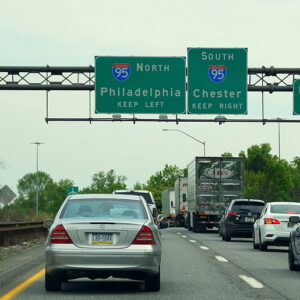A proposal to send some of Philadelphia’s city wage tax back to the suburban cities and towns where commuters live has made it through the GOP-controlled state Senate. Now its fate is in the hands of Delaware Valley Democrats, who could cross the aisle and pass the law, but are currently sitting on the sidelines.
Philadelphia currently takes 3.44 percent of wages from everyone who works in Philadelphia – regardless of where they live. That includes people whose company is in Philadelphia but who work remotely, often at home in Bucks, Chester, Delaware, and Montgomery Counties.
Even commuters who have stopped commuting have the tax automatically taken out of their paychecks.
“Because residents who live in surrounding municipalities but work in Philadelphia pay all of their local income tax to the city rather a portion to their home municipality, the tax burden is greater for non-Philadelphia workers of those municipalities,” said Sen. Frank Farry (R-Langhorne).
Philadelphia is the only Pennsylvania city with a wage tax that doesn’t remit it back to out-of-town communities.
That was one reason why the Senate approved SB 671. also known as the Commuter Tax Fairness Act, sponsored by Farry. His bill would return 1 percent of the 3.44 percent to workers’ home cities and townships if they have an earned income tax.
“Why should Philadelphia be treated differently?” Farry told DVJournal. “When COVID struck, and the governor and the mayor made work-from-home orders, residents still had to pay the tax. It made no sense because they weren’t working in Philadelphia.”
Farry sees it as a double taxation issue. He said communities have to make up the tax money that Philadelphia withholds from them due to the City Wage Tax. According to Farry, Bensalem loses $2.5 million in tax dollars because of the more than 5,000 residents who work in Philadelphia.
“Everybody has to make up for that shortfall. And for the residents that live in Bensalem but work in [Philadelphia], they’re still paying the tax. They just don’t get any of the benefit of it back in their home community,” Farry said.
Philadelphia officials aren’t exactly known for showing brotherly love toward out-of-town community governments or residents on the wage tax issue. As DVJournal has previously reported, Philadelphia’s vague guidelines during the pandemic made it difficult for some workers to tell if they were exempt from the tax or not. It is also up to workers to apply for a tax refund.
That has rankled mayors and township managers outside Philadelphia.
“While every other municipality in the commonwealth must reimburse earned income tax revenues collected from non-residents to the home municipalities of those non-residents, Philadelphia is alone in its ability to keep for itself, both the earned income tax of its residents and all of the non-residents who work in the city,” said Bensalem Mayor Joseph DeGirolamo in May when the Commuter Tax Fairness Act originally passed.
“[W]ithout having to remit any portion or percentage of those non-resident revenues back to the home municipality of those non-residents.”
The bill is currently stuck in the House, where Democrats took control with a one-vote majority last year. With the partisan balance currently tied at 101-101, it would only take a single House Democrat to cross the aisle to give the legislation a majority in the House.
However, Democrats representing the Philadelphia suburbs appear to be following the lead of House leadership and are declining to back the bill.
DVJournal reached out to Democrats in the Delaware Valley delegation and asked if they would support the wage tax bill in the House. Reps. Tim Brennan (D-Doylestown), Tina Davis (D-Levittown), John Galloway (D-Levittown), Steven Malagari (D-Lansdale), and Brian Monroe (D-Warminster) all declined to answer.
Tax reform groups believe the Senate made the right decision by passing the bill and hope the Democratic-controlled House will follow suit. “Blue cities have been relying on bailout dollars and taxes from people who don’t live within their borders and sometimes never set foot there,” said Douglas Kellogg, state projects director at Americans for Tax Reform.
“The Commuter Tax Fairness Act is a simple, more sensible division of tax revenue, but it could have a major impact as a wakeup call to Philadelphia leaders to stop over-relying on funds from taxpayers who don’t live there and start fixing the issues that are driving tens of thousands of residents to flee. “
Farry said he would keep pushing until his bill passes.
“I don’t plan on going anywhere, so it will keep being brought up,” he said. “We’ve heard a lot from the business community about it. They have concerns with the way the city acts as well in terms of processes and taxation and whatnot…I wouldn’t want to be a House member in the majority and not have this issue come up to be addressed for the residents of my community.”
Farry thinks that a lot of central Pennsylvania politicians don’t realize that some of their constituents pay Philadelphia’s wage tax. too. “Apparently, a lot of people from central Pennsylvania jump on Amtrak out there and come into the city. So, [a legislator] was finding out from her home communities [that they] aren’t getting their fair share back.”
The Pennsylvania House is scheduled to reconvene on September 26.
Please follow DVJournal on social media: Twitter@DVJournal or Facebook.com/DelawareValleyJournal

